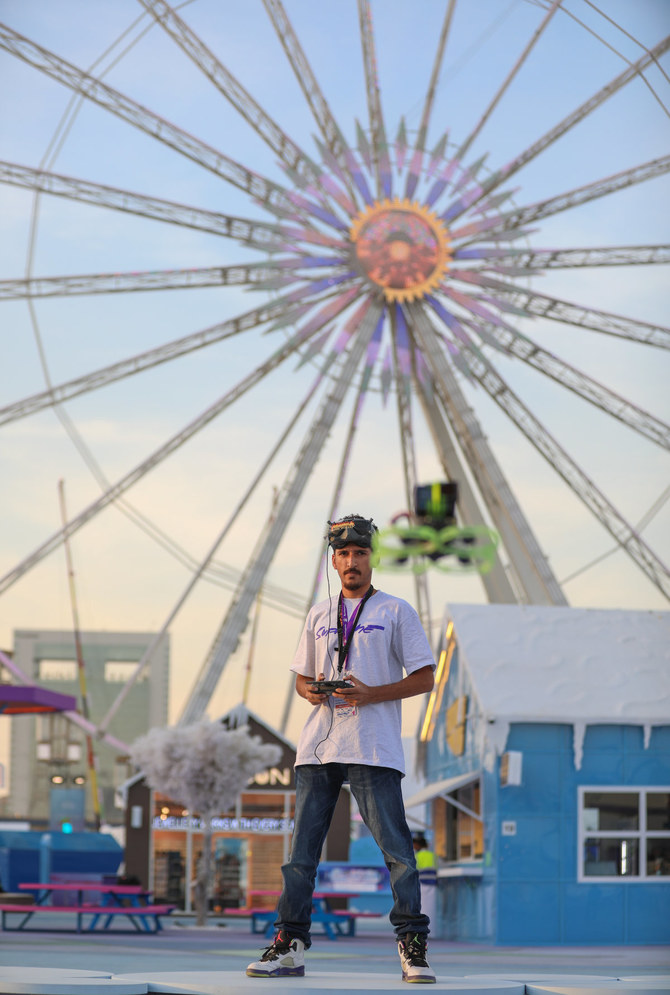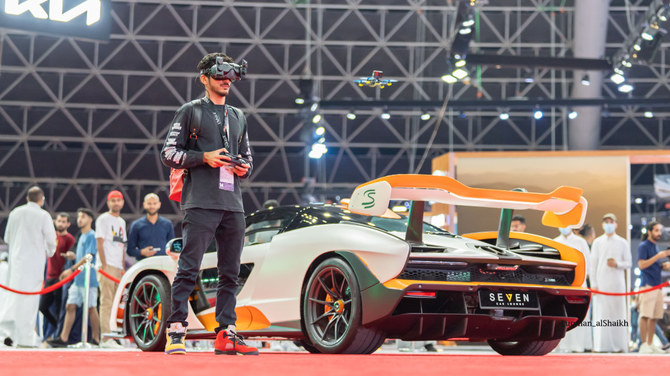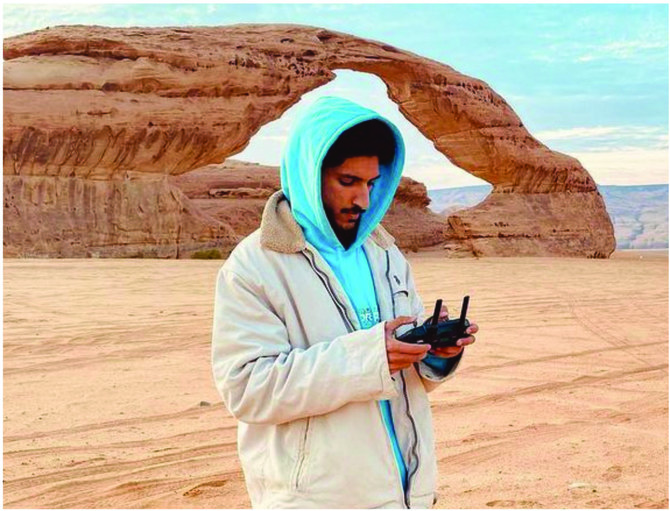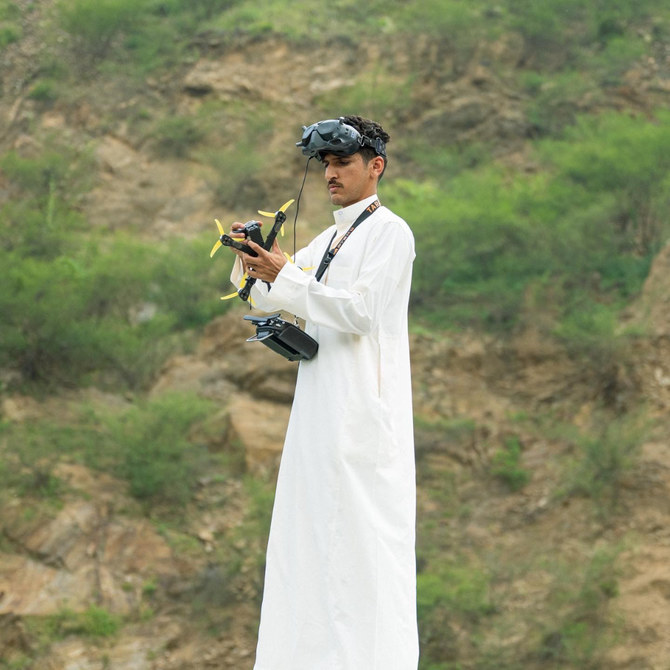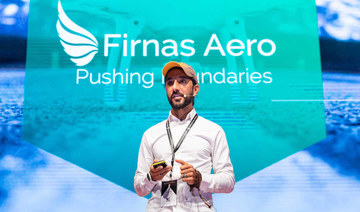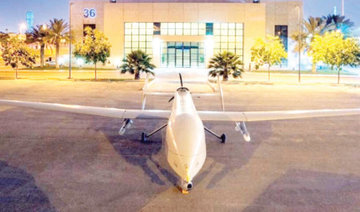DHAHRAN: Armed with a backpack full of heavy gear and a quiet confidence, 24-year-old Mohammed Ghazi takes a deep breath as he puts his work goggles on. Then the magic, or buzzing, begins.
At the King Abdulaziz Center for World Culture’s (Ithra) library, the quiet space jolts to life as Ghazi’s drone takes flight. While photographers are often spotted at the stunning library, it is unusual to see images being captured by a drone during working hours.
Ghazi, who has many family members in Dhahran, feels a personal connection to the city. On getting the rare opportunity to fly his drone camera at Ithra’s library, he told Arab News: “I always thought ‘I can’t wait for the chance to get to drone it,’ which is not that easy. No one gets to drone Ithra. So it is a real honor to get to say that I was able to — and not outside, inside.”
The drone flies over the bookshelves and above visitors. It is almost enough to give you motion sickness — but Ghazi remains unfazed. As the son of a pilot, flying is in his blood.

With the use of drones, Mohammed Ghazi intends to tell the visual stories of the Kingdom’s many regions and its people. (Supplied)
From a very young age, he would visit his father at work in the cockpit. The experience propelled him to pursue that same love but with his own take on it.
“I gravitated toward drones, which is fun, because my dad was a pilot for Saudia Airlines,” he said. Ghazi had meant to follow in his father’s footsteps, but eventually ended up going to art school.
Born in Jeddah, Ghazi moved to the US when he was two years old. During his childhood in Philadelphia he developed a love of films, and when it was time to choose a major for university, he opted for a bachelor’s in film design and production.
Ghazi’s mother enrolled at the same university to earn her master’s degree in art education. They were in some of the same classes, which led to some healthy competition between mother and son.
He never stopped longing to visit Saudi Arabia, and when classes shifted to online learning during COVID-19, he jumped at the chance to visit his hometown. It was meant to be a short trip to visit family in Jeddah, but Ghazi was amazed at how different yet familiar his birthplace was.
He never flew back to the US. “My round trip was for two weeks. I went and ended up staying. I never went back ‘home.’ I was so shocked — it just was a whole different Saudi,” he said.
After witnessing the transformation of the country, Ghazi realized that the Kingdom was full of opportunities and that he wanted to be a part of the change. Instead of watching from afar, he decided to take his filmmaking skills and aim for lift off.
“I hit the ground running working on film productions … and gravitated toward drone operating. Prior to drone operating, I was just kind of testing the waters in the film industry here, I was doing a little bit of everything but it never really fit — I didn’t feel like it was me,” he said.
Ghazi found a way to merge his love of adventure and filmmaking with his passion for flying. With his interest and knowledge in aviation, he taught himself how to operate different types of drones.
He ended up favoring the First Person View, or FPV, drones, which include goggles.
However, working them is not as easy as it may look, and sometimes there are losses. “A big part of the game is crashing. But, you know, what’s more important than crashing is picking up the pieces and getting back up.
“It’s like a life lesson for me, no matter what happens, no matter how many times you get knocked down, you have got to get back up, no matter how difficult the shot is,” Ghazi said.
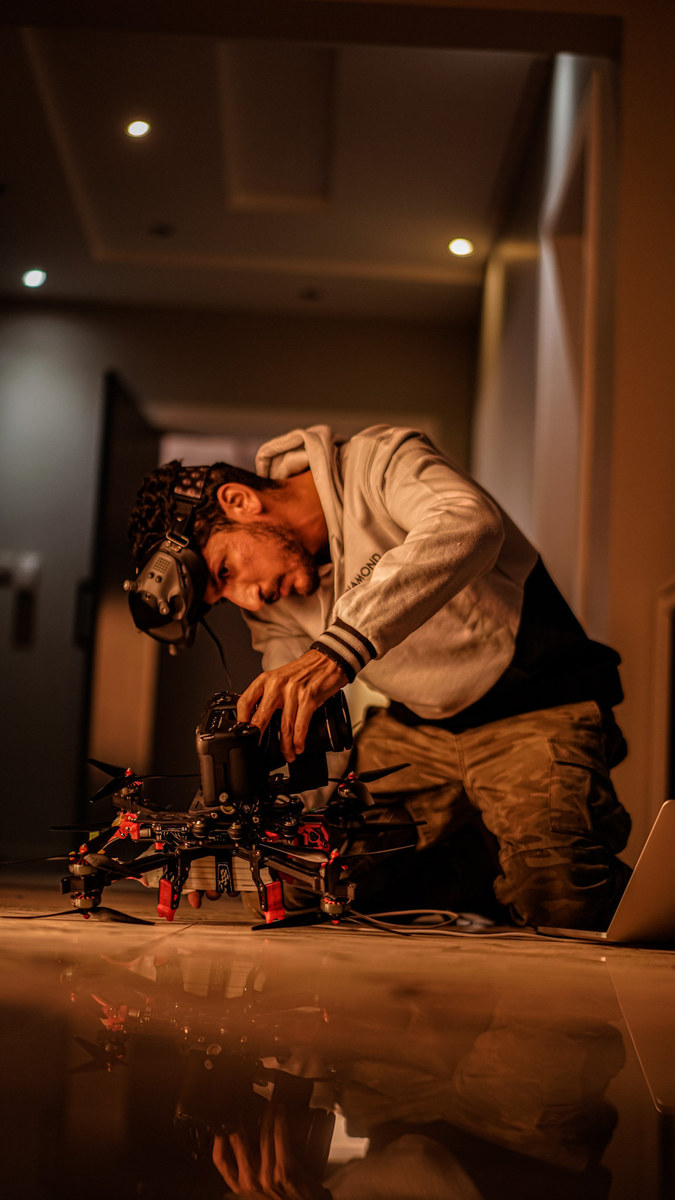
With his interest and knowledge in aviation, Mohammed Ghazi taught himself how to operate different types of drones. (Supplied)
While filming, Ghazi tends to bring several backups because the process can be risky. “I’m always pushing the limits.” he said. “If you’re a director and you tell me ‘Hey, can we get this shot?’ I’ll take a look at it. I’ll think of my own way to kind of spice it up and make it a little bit difficult, more intriguing, more breathtaking. And sometimes that takes a little bit of a risk.”
Ghazi recalled that on one occasion he handed his father a second pair of goggles to see what he was doing.
“My dad is a commercial airline pilot, which means he’s all about safety and the right procedures. When he sees me doing my maneuvers (such as) going up and down, getting super close to people … I would hear him in the background, just making all these noises, holding his breath,” he said.
The General Authority of Civil Aviation has set down regulations for safe drone flying and Ghazi has all of the proper credentials to be a drone pilot. So, while he pushes the limits, he also follows protocol.
The recreational and professional use of drones is legal in the Kingdom but it requires registration, along with a fee and some form-filling.
The process is more streamlined than previously as many local filmmakers are operating drones to experiment with different ways to get aerial shots.
An avid lover of films, when Ghazi watches Hollywood films or European projects, his eye is on the competition. He is honing his skills so that he can get any job done “no matter how difficult the shot is.”
Since returning to the Kingdom a little over two years ago, Ghazi has gotten to know the local community and connect with like-minded individuals.
One such new acquaintance is fashion brand Galag’s co-founder, Sultan bin Mohammed, whom he met by chance a few months ago. The two instantly hit it off, connecting through their mutual love of adventure, films and fast-moving devices.
The pair traveled to Sweden together recently to work on a project. Mohammed brought cars, and Ghazi brought drones to collaborate on some filming.
“Sultan is like a big brother to me. And before I even met personally, when I was younger in Saudi, I was always looking up to his work. Some of the footage that I got from there is just like world-class, top-notch aerial filmmaking. It’s filmmaking at its finest,” Ghazi said.
His other big collaborator is drone expert Abdulhadi Azouz, who co-founded AZ Aerials with Ghazi. Azouz is also a Saudi who grew up in the US, and is much older than him so able to bring a wisdom and experience that elevates their craft to new heights.
Working together they are able to manage more projects and have developed a strategy for filmmaking and aerial cinematography.
Their clients include the Ministry of Tourism, Ministry of Sports, Saudia Airlines, Aramco, MDLBeast, the General Entertainment Authority, Riyadh Season, and many other high-profile entities.
Currently based in Riyadh, Ghazi intends to tell the visual stories of the Kingdom’s many regions and its people.
Like the morphing vistas that make up the ever-changing landscapes of the country, you can spot him chasing the shot as his drone whizzes by the ancient formations of AlUla, the rolling mountains of Jazan or even the carefully curated books at Ithra’s library.
Ghazi’s persistence and perseverance, in addition to his insistence that every shot and frame should breathe new life into a project, differentiates him from his peers and competitors.
He is keen to explore the depths under the sea, too. But for now, Ghazi feels most at ease when he is able to capture the country’s story from above. The sky may be the limit, but he’s the one aiming for the compelling new angle.
“It’s always been a dream of mine to fly. Drones are fun, but FPV — it’s a whole different world. It makes me feel like I’m at home. Like right now — when I don’t have my goggles on — I don’t feel that. When I put those goggles on, I feel like ‘OK, I’m here. This is this is where I’m supposed to be.’”


